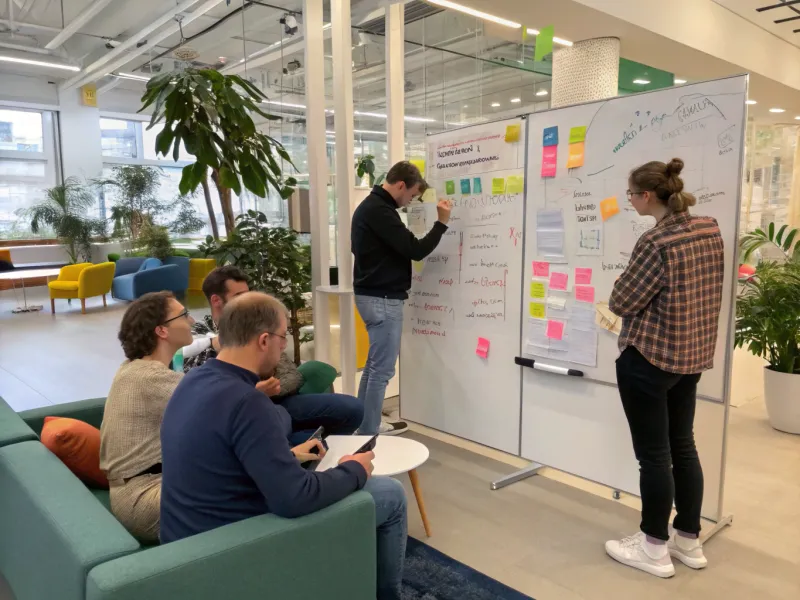Avete mai notato che alcune persone sembrano avere un modo di dire che fa alzare tutti in piedi ad ascoltare? Secondo la psicologia, le persone altamente intelligenti hanno spesso una serie di frasi uniche nel loro vocabolario che non solo trasmettono saggezza, ma danno vita a conversazioni coinvolgenti.
Se state cercando di rendere più vivace il vostro dialogo o siete semplicemente curiosi di sapere quali sono queste frasi, siete nel posto giusto.
Esaminiamo 42 di queste affascinanti espressioni e vediamo cosa le rende le scelte preferite dagli intellettuali.
1. "Può approfondire questo punto?".
C'è qualcosa di incredibilmente attraente in una persona che vuole sinceramente capire di più. Avete mai partecipato a una chat in cui qualcuno vi chiede di approfondire qualcosa che avete appena detto? Vi fa venire i brividi, vero? Questo perché sono sinceramente interessati al vostro punto di vista. Questa frase è un segno di una mente curiosa che privilegia la profondità rispetto alla superficialità.
Di solito, chi lo chiede è un pensatore profondo, qualcuno che ama scavare oltre le interpretazioni superficiali. Quando lo sento, so che sto parlando con qualcuno che apprezza le sfumature e le complessità della vita. Non si tratta solo di ottenere maggiori informazioni, ma di mostrare rispetto per le intuizioni della persona.
La bellezza di questa frase è la sua semplicità e il livello di coinvolgimento che suscita. Invita l'interlocutore a disfare i propri pensieri, consentendo un dialogo più ricco. Se volete migliorare la vostra conversazione, provate a inserire questa frase nei vostri discorsi. Vi stupirete di come aprirà le porte a connessioni più significative!
2. "Cosa ne pensate di questo?".
Quando qualcuno chiede il vostro parere, è come se vi offrisse un posto al tavolo delle idee. È una domanda che dà potere e riconosce che la vostra opinione ha un peso. Questa frase è spesso usata da chi apprezza le diverse prospettive e conosce il valore dell'inclusività nelle discussioni.
Invitando gli altri a condividere i loro pensieri, si apre uno spazio per il brainstorming e il pensiero creativo. Non si tratta solo di riempire il silenzio, ma di costruire un dialogo in cui la voce di tutti sia ascoltata e rispettata.
La prossima volta che vi trovate in una riunione o in una conversazione informale, lanciate questa frase. Scoprirete che agisce da catalizzatore per una comunicazione aperta e una comprensione reciproca. Inoltre, dimostra che vi interessa ciò che gli altri apportano al tavolo, una caratteristica di chi è veramente persone intelligenti.
3. "Non avevo considerato questa prospettiva".
Questa espressione è come un umile cenno alle nuove idee. Quando qualcuno dice: "Non avevo considerato questa prospettiva", rivela un'apertura all'apprendimento e all'adattamento. È una frase che riconosce che c'è sempre spazio per la crescita e la comprensione dei nostri pensieri e delle nostre convinzioni.
Quando si usa questa frase, si dimostra che non solo si ascolta attivamente, ma si è anche disposti a lasciare che nuove informazioni influenzino le proprie opinioni. Si tratta di un distacco rinfrescante dal pensiero rigido che può soffocare il progresso. Al contrario, favorisce un ambiente in cui l'innovazione e le idee fresche possono fiorire.
L'inserimento di questa frase nelle vostre conversazioni invita gli altri a condividere liberamente le loro intuizioni. Crea uno spazio sicuro in cui tutti sentono che i loro contributi sono apprezzati. Quindi, usatela pure quando qualcuno vi offre una prospettiva che non vi era venuta in mente. Vedrete che arricchirà le vostre discussioni e amplierà i vostri orizzonti.
4. "Potrebbe aiutarmi a capire meglio?".
La ricerca di chiarezza è un segno distintivo dell'intelligenza. Questa frase è un modo gentile per dire: "Apprezzo la tua conoscenza e voglio saperne di più". È perfetta per le situazioni in cui ci si sente un po' smarriti ma si è desiderosi di cogliere le sfumature di un argomento.
L'uso di questa domanda dimostra umiltà e volontà di essere vulnerabili, il che può essere piuttosto rinfrescante in un mondo ossessionato dall'avere tutte le risposte. Ci ricorda che nessuno sa tutto e che spesso chiedere assistenza è la mossa più intelligente.
Crea legami, mostra rispetto per le competenze altrui ed è un modo meraviglioso per imparare. Inoltre, le persone apprezzano il fatto di essere considerate esperte, il che rende la cosa vantaggiosa per tutte le parti coinvolte.
5. "Lasciatemi fare l'avvocato del diavolo per un momento".
Ecco un'espressione che vivacizza qualsiasi dibattito! Quando qualcuno dice: "Lasciatemi fare l'avvocato del diavolo", non fa solo il difficile, ma si spinge oltre per esplorare tutti gli aspetti di un argomento. È un modo intelligente per testare la forza di un'idea considerandone le debolezze.
L'uso di questa frase dimostra che non si ha paura di sfidare le opinioni prevalenti, anche se solo per il gusto di discutere. È un modo per scavare più a fondo e vedere se il concetto è valido sotto esame. Questo può portare a idee e soluzioni più forti e resistenti.
Scoprirete che incoraggia il pensiero critico e la risoluzione creativa dei problemi. Inoltre, è un modo subdolo per mantenere le cose interessanti e coinvolgenti per tutti i partecipanti.
6. "Quali sono le prove a sostegno di questa tesi?".
Nel regno delle conversazioni intelligenti, le prove la fanno da padrone. Chiedere "Quali sono le prove a sostegno di questa affermazione?" è un modo delicato per esortare gli altri a sostenere le loro affermazioni con i fatti. Dimostra che non ci si limita ad accettare le idee al valore nominale, ma che si è interessati alla verità.
Questa domanda incoraggia il pensiero critico e aiuta a vagliare le ipotesi per arrivare al nocciolo della questione. Non si tratta di minare qualcuno, ma di promuovere una cultura di responsabilità e autenticità.
Se volete che le conversazioni siano più che semplici, questa frase è il vostro punto di riferimento. Fa avanzare le discussioni e garantisce che le conclusioni siano fondate. È anche un ottimo modo per dimostrare il proprio impegno verso l'integrità e la ricerca della verità.
7. "Come si allinea con i nostri obiettivi?".
Allineare le azioni con gli obiettivi è fondamentale in qualsiasi contesto e questa frase mette in evidenza questo aspetto. È un modo strategico per orientare le conversazioni verso lo scopo e l'efficienza, assicurando che gli sforzi non vengano sprecati in tangenti irrilevanti.
Quando chiedete in che modo qualcosa si allinea con gli obiettivi, sollecitate una riflessione sulle priorità e sul quadro generale. In questo modo le discussioni rimangono orientate agli obiettivi e produttive, assicurando che tutti siano sulla stessa lunghezza d'onda.
La prossima volta che dovete dirigere un progetto o una riunione, usate questa frase per guidare la conversazione. Aiuta a mantenere una direzione chiara e garantisce che tutti gli sforzi siano allineati con i risultati desiderati, massimizzando così il successo.
8. "È un punto affascinante".
I complimenti hanno un modo magico di incoraggiare il dialogo. Dicendo: "È un'osservazione affascinante", apprezzate il contributo di qualcuno e lo invitate a condividere di più.
È una frase che non solo riconosce ma valorizza i diversi punti di vista. Segnala apertura mentale e un genuino interesse ad apprendere dagli altri, che è una caratteristica di individui altamente intelligenti.
Nella prossima conversazione, provate questa frase. Vedrete che incoraggerà le persone ad aprirsi e a condividere più idee, portando a scambi più ricchi e coinvolgenti. Inoltre, è un ottimo modo per creare un rapporto e un rispetto reciproco.
9. "Potrebbe chiarire cosa intende dire?".
La chiarezza è fondamentale in ogni discussione. Quando chiedete a qualcuno di chiarire ciò che intende, dimostrate di prestare attenzione e di essere desiderosi di comprendere appieno. Questa domanda è l'epitome dell'ascolto attivo.
Previene i malintesi e garantisce che tutti siano sulla stessa lunghezza d'onda, facilitando una comunicazione più fluida ed efficace. Inoltre, dimostra il vostro impegno a capire piuttosto che a sentire.
Favorisce una cultura della trasparenza e della precisione e le persone apprezzeranno il vostro sforzo di capire davvero ciò che dicono.
10. "Capisco dove vuoi arrivare".
Questa frase è come un caldo abbraccio per le conversazioni. Mostra empatia e comprensione, riconoscendo il punto di vista dell'altra persona anche se non si è necessariamente d'accordo. È un modo semplice ma efficace per creare rapporti e fiducia.
Quando dite a qualcuno che capite da dove viene, gli dite che state ascoltando attivamente e rispettate la sua prospettiva. In questo modo si colmano le lacune di comprensione e si fa sentire l'altra persona apprezzata e ascoltata.
L'uso di questa frase può allentare la tensione e favorire un dialogo più aperto e onesto. È uno strumento utile sia in ambito personale che professionale, che aiuta a creare uno spazio sicuro per le diverse opinioni. Provatela e osservate come trasforma le vostre interazioni in scambi più significativi.
11. "Avete considerato le alternative?".
Esplorare le alternative è un modo sicuro per risolvere i problemi in modo innovativo. Chiedendo se qualcuno ha considerato le alternative, incoraggiate una visione più ampia delle possibilità.
Questa domanda promuove il pensiero critico e assicura che le decisioni siano complete. Non si tratta di fare buchi, ma di promuovere la creatività e di esplorare tutte le strade.
Incorporate questa frase nelle vostre discussioni per aiutare ad aprire le menti e incoraggiare idee diverse. È un ottimo modo per garantire che le soluzioni siano complete e veramente efficaci. Inoltre, dimostra che siete interessati al processo, non solo al risultato.
12. "Qual è il suo ragionamento?".
Capire le ragioni delle idee è fondamentale in qualsiasi discorso intellettuale. Quando chiedete le ragioni di qualcuno, esprimete un interesse genuino per il suo processo di pensiero, il che può essere molto stimolante.
Questa domanda scava nel "perché" dietro il "cosa", promuovendo un'esplorazione più profonda dell'argomento in questione. Incoraggia argomentazioni ben ponderate e aiuta a evitare che le supposizioni offuschino il giudizio.
La prossima volta che sentite un punto interessante, chiedete di spiegarne le ragioni. Sarete sorpresi dalle intuizioni che otterrete e dalle ricche discussioni che ne seguiranno. È un modo sottile ma potente per elevare la conversazione e favorire la comprensione reciproca.
13. "Come posso sostenerti in questo?".
Offrire sostegno è un segno distintivo dell'intelligenza emotiva. Quando chiedete come potete sostenere qualcuno, dimostrate di non limitarvi alle parole, ma di passare ai fatti.
Questa frase favorisce una mentalità orientata alla squadra e incoraggia la collaborazione. Dice agli altri che siete pronti a rimboccarvi le maniche e a contribuire, rafforzando il legame di fiducia e il cameratismo.
Apre un dialogo su come si possa davvero fare la differenza, costruendo relazioni più forti e solidali.
14. "Cosa ti serve da me per far sì che questo accada?".
Questa frase riguarda la responsabilizzazione e l'incoraggiamento. Chiedendo cosa si può fornire per far accadere qualcosa, si partecipa attivamente al successo degli altri.
Sposta l'attenzione dai problemi alle soluzioni, favorendo un approccio proattivo. Non si tratta solo di offrire aiuto, ma di garantire che l'aiuto sia efficace e significativo.
Includete questa frase nelle vostre conversazioni per ispirare l'azione e la collaborazione. Dimostra che siete interessati ai risultati e pronti a dare il vostro sostegno in modo concreto. Inoltre, rafforza le partnership dimostrando che siete un giocatore di squadra affidabile.
15. "Quali potenziali ostacoli dobbiamo prevedere?".
Prevedere gli ostacoli è un'abilità che le menti intelligenti utilizzano spesso. Chiedendo informazioni sui potenziali ostacoli, vi preparate ad affrontare le sfide prima che si presentino, il che è fondamentale per una pianificazione di successo.
Questa domanda incoraggia a pensare al futuro e garantisce che i piani siano solidi e adattabili. Sposta la conversazione dal semplice ottimismo a strategie realistiche che tengano conto delle incertezze.
16. "Qual è il problema di fondo?".
Andare alla radice di un problema è essenziale per risolverlo in modo efficace. Chiedendo informazioni sul problema di fondo, si incoraggia un'esplorazione più profonda al di là dei sintomi superficiali.
Incorporate questa frase nelle vostre sessioni di risoluzione dei problemi per assicurarvi di affrontare le questioni fondamentali e non solo i sintomi. In questo modo si ottengono soluzioni più sostenibili e discussioni più profonde.
17. "Esaminiamo i pro e i contro".
Soppesare i pro e i contro è un approccio classico al processo decisionale. Suggerendo questo, vi assicurate una visione equilibrata della situazione, essenziale per fare scelte consapevoli.
Questa frase incoraggia un'analisi completa e impedisce che i pregiudizi emotivi influenzino le decisioni. Si tratta di essere obiettivi e metodici nel valutare le opzioni.
18. "Che impatto potrebbe avere sul futuro?".
Pensare al futuro è una caratteristica delle menti intelligenti. Interrogandosi sugli impatti futuri, si considerano le conseguenze a lungo termine di decisioni e azioni, il che è fondamentale per un successo sostenibile.
Nella prossima riunione strategica, sollevate questa domanda per ispirare la lungimiranza e la pianificazione a lungo termine. Aiuta ad allineare le azioni a breve termine con le aspirazioni future, garantendo un progresso coerente verso gli obiettivi generali.
19. "Qual è il quadro generale?".
Vedere il quadro generale è fondamentale per una comprensione olistica delle situazioni. Chiedendo informazioni, si incoraggia una prospettiva ampia che incorpora tutte le sfaccettature di uno scenario.
Includete questa frase nelle vostre discussioni per elevare le conversazioni dai dettagli alla narrazione generale. Contribuisce a garantire che le decisioni siano informate da una comprensione completa di tutti i fattori che le influenzano.
20. "Come possiamo innovare in questo settore?".
L'innovazione è la forza trainante del progresso. Chiedendo come innovare, si apre un dialogo per soluzioni creative e progressi che possono stabilire nuovi punti di riferimento.
Questa domanda incoraggia il pensiero fuori dagli schemi e sfida le norme convenzionali. Si tratta di esplorare nuove possibilità e di superare i limiti per scoprire nuovi approcci.
21. "Questo mi ricorda...".
Persone altamente intelligenti spesso tracciano collegamenti tra le nuove informazioni e le loro conoscenze esistenti. Quando dicono: "Questo mi ricorda...", collegano la discussione attuale a esperienze, teorie o intuizioni passate.
Questa capacità di collegare i punti e vedere gli schemi è un segno distintivo della sofisticazione cognitiva.
Facendo questi collegamenti, non solo arricchiscono la conversazione, ma aiutano anche gli altri a vedere prospettive diverse. È un modo per condividere la saggezza e favorire una comprensione più profonda dell'argomento in questione. Queste interazioni possono ispirare gli altri a pensare in modo critico e ad ampliare i propri orizzonti.
22. "Qual è il modo più efficace per farlo?".
L'efficienza è un segno distintivo dell'azione intelligente. Chiedendo il modo più efficace per realizzare qualcosa, vi assicurate che gli sforzi siano ottimizzati per ottenere il massimo impatto.
Questa domanda promuove la pianificazione strategica e l'utilizzo delle risorse, riducendo al minimo gli sprechi e massimizzando i risultati. Si tratta di lavorare in modo più intelligente, non più difficile.
23. "Qual è il fondamento logico di questa decisione?".
La comprensione delle motivazioni alla base delle decisioni è fondamentale per una collaborazione informata. Chiedendo le motivazioni, si cerca di ottenere trasparenza e chiarezza nei processi decisionali.
Usate questa frase per promuovere un ambiente di fiducia e trasparenza nelle vostre discussioni di lavoro o personali. Aiuta a chiarire le intenzioni e garantisce che tutti siano allineati con i criteri decisionali.
24. "Cosa possiamo imparare da questa esperienza?".
Imparare dalle esperienze è una pietra miliare della crescita. Chiedendo cosa si può imparare, ci si assicura che ogni esperienza, buona o cattiva, contribuisca allo sviluppo personale o organizzativo.
Si tratta di estrarre valore da ogni situazione e di applicare queste intuizioni per il successo futuro.
Nella prossima sessione di debriefing o di riflessione, utilizzate questa domanda per catalizzare l'apprendimento e la crescita. Trasforma le esperienze in lezioni preziose e favorisce una cultura dell'apprendimento permanente e dell'adattabilità.
25. "È questo l'uso migliore delle nostre risorse?".
L'ottimizzazione delle risorse è una componente fondamentale della pianificazione strategica. Mettendo in discussione l'uso delle risorse, ci si assicura che siano allocate in modo efficace per raggiungere i risultati desiderati.
Incorporate questa frase nella valutazione dei progetti per assicurarvi che le risorse siano utilizzate in modo efficiente. Aiuta a prevenire le spese eccessive e promuove una cultura di gestione prudente delle risorse.
26. "Come si concilia con i nostri valori?".
Allineare le azioni ai valori è fondamentale per l'integrità e la coerenza. Chiedendo questa corrispondenza, vi assicurate che tutte le azioni siano coerenti con i principi e le convinzioni fondamentali.
Questa domanda promuove l'introspezione e l'allineamento, garantendo che le decisioni non siano solo efficaci, ma anche etiche e autentiche. Si tratta di mantenere integrità e coerenza in tutti gli sforzi.
27. "Come potrebbe questa decisione influenzare gli altri?".
L'empatia nel processo decisionale è fondamentale per comprendere e rispondere alle esigenze degli altri. Considerando i suoi effetti, vi assicurate che le decisioni siano compassionevoli e attente.
Incorporate questa frase nel vostro processo decisionale per garantire che i risultati siano vantaggiosi per tutte le parti coinvolte. Favorisce una cultura dell'empatia e della considerazione, migliorando le relazioni e la fiducia.
28. "Qual è l'obiettivo finale?".
La comprensione dell'obiettivo finale chiarisce la direzione e lo scopo. Concentrandosi su questo aspetto, si allineano gli sforzi verso un risultato specifico e desiderato, garantendo chiarezza e motivazione.
Questa domanda promuove la focalizzazione strategica e garantisce che le azioni siano mirate e dirette al raggiungimento degli obiettivi generali. Si tratta di mantenere la rotta e la chiarezza.
29. "Potrebbe fornire degli esempi?".
Gli esempi sono strumenti potenti per comprendere e convalidare i concetti. Chiedendoli, si incoraggia la chiarezza e si assicura che le idee siano fondate sulla realtà.
Questa domanda favorisce la comprensione e la legittimazione, rendendo i concetti astratti più tangibili e relazionabili. Si tratta di collegare la teoria alla pratica.
Nella prossima discussione, chiedete degli esempi per migliorare la comprensione e illustrare i punti. Questo aiuta a chiarire idee complesse e assicura che le discussioni siano fondate e pratiche.
30. "Consideriamo le implicazioni".
Di fronte a decisioni o a nuove idee, le persone altamente intelligenti usano spesso la frase "Consideriamo le implicazioni". Questo dimostra la loro tendenza a pensare in anticipo e a valutare i potenziali risultati prima di procedere. È un approccio strategico che tiene conto di vari scenari e del loro possibile impatto.
Questa lungimiranza aiuta a prendere decisioni informate e a evitare le insidie. Considerando le implicazioni, si assicura che le azioni siano in linea con gli obiettivi e i valori a lungo termine. Questa frase incoraggia una mentalità responsabile e lungimirante in qualsiasi discussione.
31. "Qual è il nostro piano di emergenza?".
La preparazione è fondamentale per gestire le incertezze. Chiedendo informazioni sui piani di emergenza, vi assicurate che ci siano piani in atto per affrontare potenziali sfide e cambiamenti.
32. "Qual è un'angolazione diversa che potremmo considerare?".
Guardare le questioni da diverse angolazioni è essenziale per una comprensione completa e per l'innovazione. Considerando altre prospettive, si amplia la portata dell'analisi e della creatività. Questa domanda incoraggia la diversità di pensiero e previene la visione a tunnel, assicurando che le decisioni siano complete e di ampio respiro.
33. "Possiamo semplificare questo?".
La semplicità spesso porta alla chiarezza e all'efficacia. Chiedendo di semplificare, vi assicurate che le idee e i processi siano chiari e comprensibili.
34. "Qual è il prossimo passo da fare?".
I progressi si ottengono compiendo passi chiari e praticabili. Concentrandosi sul passo successivo, ci si assicura che lo slancio venga mantenuto e che gli obiettivi vengano costantemente raggiunti. Usate questa frase per guidare l'azione e far avanzare i progetti.
35. "Abbiamo tutti i fatti?"
Le decisioni informate richiedono informazioni complete. Chiedendo se tutti i fatti sono stati raccolti, vi assicurate che le decisioni siano basate su dati completi e accurati.
36. "Come possiamo misurare il successo?".
La misurazione del successo è fondamentale per comprendere i progressi e i risultati ottenuti. Chiedendo come misurarlo, ci si assicura che gli obiettivi siano tracciati e i risultati valutati. Questa domanda promuove la responsabilità e la chiarezza, assicurando che il successo sia quantificabile e trasparente.
Si tratta di definire criteri chiari per il raggiungimento degli obiettivi.
37. "Qual è il motivo di questo cambiamento?".
Capire le ragioni dei cambiamenti è essenziale per un adattamento di successo. Mettendo in discussione le motivazioni, si cerca di fare chiarezza e di garantire l'allineamento con gli obiettivi. Ciò aiuta a chiarire le intenzioni e favorisce l'accettazione e il sostegno del cambiamento.
38. "Quali sono le implicazioni se non agiamo?".
Comprendere le conseguenze dell'inazione è fondamentale per prendere decisioni consapevoli. Considerando le implicazioni, si soppesano i rischi e si adottano misure proattive.
Questa domanda incoraggia la lungimiranza e la responsabilità, garantendo che i rischi potenziali siano riconosciuti e affrontati. Si tratta di essere proattivi e preparati alle sfide.
39. "Come possiamo convalidare questa ipotesi?".
Mettere in discussione le ipotesi è fondamentale per un processo decisionale intelligente. Quando si chiede come convalidare un'ipotesi, le persone dimostrano un impegno verso conclusioni basate su prove.
Questa frase sottolinea l'importanza di verificare le convinzioni prima di accettarle, riducendo pregiudizi ed errori. È un potente strumento di indagine scientifica e di analisi razionale.
Convalidando le ipotesi, i team possono assicurarsi che le loro strategie e soluzioni siano fondate sulla realtà, migliorando la credibilità e l'efficacia.
40. "Questo è in linea con il principio di...".
La frase "Questo è in linea con il principio di..." è un segno di una mente esperta. Indica che l'oratore ha una profonda comprensione di teorie complesse ed è in grado di collegare le discussioni attuali a principi consolidati.
Tali riferimenti dimostrano la loro conoscenza e capacità di applicare i concetti teorici a scenari reali.
Questo approccio non solo convalida l'argomento attuale, ma fornisce anche un quadro di riferimento per una migliore comprensione da parte degli altri. Si tratta di fondare le conversazioni su conoscenze consolidate, che portano a discussioni più significative e illuminate.
41. "Quale sarebbe la controargomentazione?".
Le persone altamente intelligenti sanno che ogni argomento ha più lati. Chiedendosi: "Quale sarebbe la controargomentazione?", dimostrano curiosità intellettuale e desiderio di esplorare tutte le prospettive prima di giungere a una conclusione.
Questa frase incoraggia una discussione più approfondita e garantisce che nessun punto di vista venga scartato prematuramente. È un ottimo modo per rafforzare un argomento, affinare il pensiero critico e anticipare le potenziali obiezioni prima che si presentino.
La prossima volta che discutete di un'idea, provate a incorporare questa frase. Non solo arricchisce la conversazione, ma favorisce anche una cultura di apertura mentale e di rigore analitico.
42. "In che modo questo sfida il nostro pensiero attuale?".
L'innovazione e la crescita spesso derivano dalla messa in discussione delle convinzioni esistenti. Quando qualcuno chiede: "In che modo questo sfida il nostro pensiero attuale?", segnala un'apertura a nuove idee e la volontà di evolvere la propria prospettiva.
Questa frase aiuta a superare l'autocompiacimento, invitando al dibattito costruttivo e alla risoluzione creativa dei problemi. Assicura che le discussioni vadano oltre la semplice riaffermazione di ciò che è già noto ed esplorino invece possibilità che potrebbero essere state trascurate.
L'uso di questa frase nelle conversazioni può portare a dei progressi, sia negli affari che nella scienza o nelle discussioni di tutti i giorni. È un modo semplice ma potente per mantenere la mente impegnata e ricettiva al cambiamento.











































